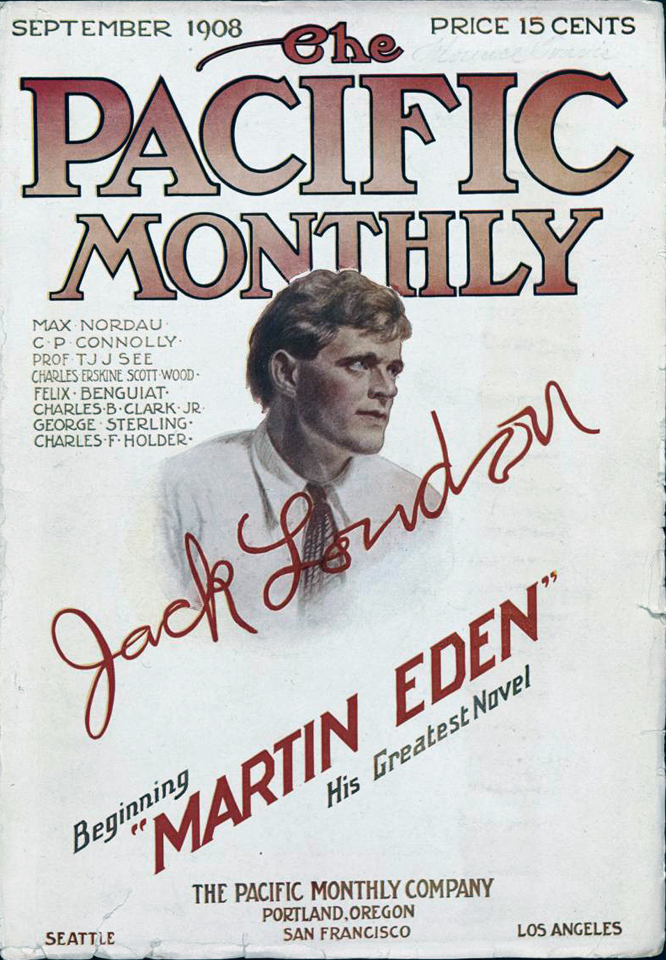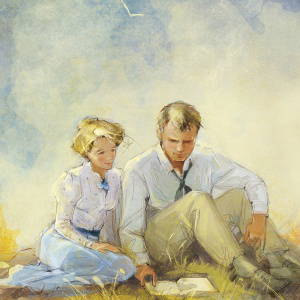Picnics in Jack London’s Martin Eden contrast social disparities between the poor working and genteel upper classes. London’s Martin Eden alludes to Horatio Alger Jr.’s heroes who rise in society through hard work and education. But London disparages Alger’s optimism. Eden’s rise from an ordinary uneducated seaman living by his fists to a successful genteel author leaves him bereft of comfort in a new social zone.
As London tells it, Eden’s life is no picnic, though the rigors of his social changes are framed by picnics that he has with two women, one upper class and the other working class. He is infatuated with Ruth Morse, a beautiful upper-class woman, who resembles Botticelli’s Venus. But their romance is intellectual. They read Algernon Swinburne’s poetry and sometimes Eden’s stories (which Ruth doesn’t like). Their courtship fizzles emotionally because Ruth is without passion. Because he is not of their class, the Morse family is disapproving; her mother condescends to a very long engagement, and Eden precludes a happy ending when he talks socialism to her father, a capitalist banker.
Eventually, a successful author, Eden, becomes well-off but spiritually unsettled. Wandering, he finds his way to the Bricklayer’s Picnic in Shell Mound Park. These are old companions, but he’s unable to join in the crowd. Seeing them is not “like old times.” Their manners make him uncomfortable; their cheap beer is no longer tasty. By chance, he meets Lizzie Connolly, a working girl who he remembers as being spunky, “a slender, dark girl, with black, defiant eyes,” now a woman, “A beauty, a perfect beauty,” he murmured admiringly under his breath.”
Chatting and dancing at the pavilion, their picnic mood is ruined when a jealous admirer brutally attacks him. Eden’s reaction is quick and violent: “Even as the thought flashed through his brain, he received a heavy blow on the side of his head that nearly knocked him down. It was a man’s fist, directed by a man so angry and in such haste that the fist had missed the jaw for which it was aimed. Martin turned as he staggered and saw the fist coming at him in a wild swing. Quite as a matter of course, he ducked, and the fist flew harmlessly past, pivoting the man who had driven it. Martin hooked with his left, landing on the pivoting man with the weight of his body behind the blow. The man went to the ground sidewise, leaped to his feet, and made a mad rush. Martin saw his passion-distorted face and wondered what could be the cause of the fellow’s anger. But while he wondered, he shot in a straight left, the weight of his body behind the blow. The man went over backward and fell in a crumpled heap.”
This ruined picnic signifies Eden’s ruin as a man without a class to belong to. His instinctive brutishness surfaces, and the veneer of his newly acquired gentility cracks. Momentarily, he finds solace thinking that Connolly is “a ray of light to me in a very dark world.” But when she says, “I don’t care whether you’re straight with me or not. You could do anything with me,” Eden cannot respond that he sees no future with a working-class woman.
Lost and depressed, but having repaid his debts and distributed as much of his wealth as he can, Eden returns to the sea as a first-class passenger on the steamer Mariposa bound for Tahiti. He thinks, “But what was it worth, after all?” And realizing that it was not, he leaps into the sea. London tells us, “ He had fallen into darkness. And at the instant he knew, he ceased to know.”
Featured Image: Ekaterina Babok.“They sat idly and silently gazing with eyes that dreamed and did not see,” in Martin Eden (2018)
See Jack London. Martin Eden. New York: The Review of Reviews Co. 1908; New York: Macmillan Company1909; http://www.gutenberg.org/files/1056/1056-h/1056-h.htm; Serialized in Pacific Monthly (Sept. 1908-Sept.1909); Hobart Bosworth. Martin Eden (1914). Screenplay by Hobart Bosworth is based on London’s novel; https://mega.nz/file/5I52FQBD#PEudTwXPXMLY8prasjdm3Gaf6Cov-LIfNm-E6QUJTKM. Hobart’s scene with Lizzie Connelly provides only a hint of the picnic that London elaborately narrates.

